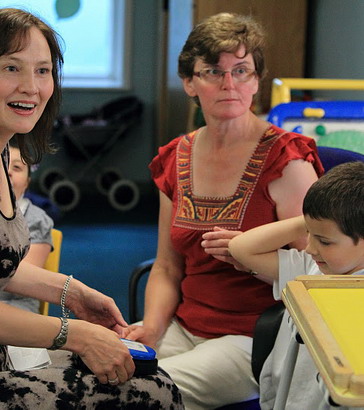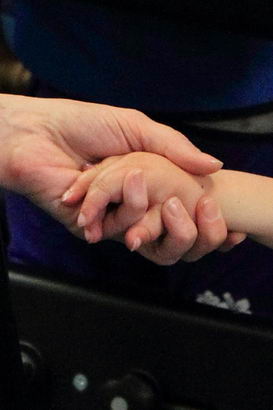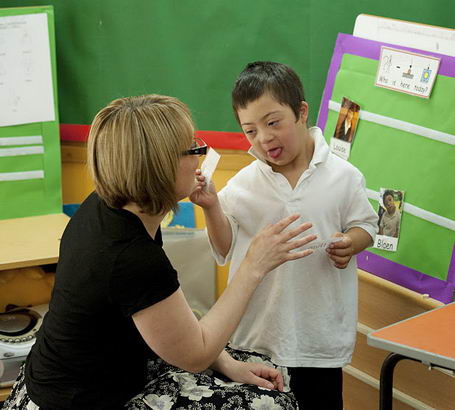
Professional practice over the past 30 years has been strongly influenced by the concept of 'partnership with parents'.
What initiatives do you currently have in your school for strengthening partnership with families?
Think about your own practice and list the ways in which you keep in contact.
Do you plan positive opportunities to make contact with parents or do you only speak with them when there is something negative to report?
How do you involve other family members?

The professionalism on which you stand is not a different road to the
one on which we tread...It's also the road that's cushioned and softened by the laughter and the smiles of love, and tears
of our children. That road is the same road, and, when we relate to each other, we have the partnership that dreams are made
of. From the educational psychologist who sits with you and tries to translate the vision you have for your child in the way
his or her report is written, to the occupational therapist who'll make a separate attachment to your child's wheelchair so
the cat can curl up next to your child, to the midwife who finds a lovely position you can feed your child in even though
it's completely against her textbook knowledge...These are professionals who are working in the spirit of the term 'partnership'.
Manuel, 2009

Some of the roles assigned to parents cause great pain. What is imposed
on parents is often based on mistaken belief, historical prejudice and myths. Negative attitudes towards disability have strongly
shaped what we do to people who are disabled, how it is done, and the consequences for their family.
Wills, R. (1994) It is Time to Stop, in: Ballard, K. (ed.) Disability, Family, Whanau, and Society, Palmerston
North, The Dunmore Press.
Research suggests that families of children and young people with disabilities feel more positive about their relationship with school when:
- Their views are listened to and taken seriously.
- They are given good clear information.
- They perceive that the school is doing something to help.
- They are involved in developing a shared approach to their child's progress.
- They have the support of others who understand or have been through similar experiences.
- Their own access needs are taken into account.
Listen to Emma's mother talking about school support.

A home-school diary is a simple way of involving parents in the day-to-day events of the child or young person's school life. It is usually a small exercise book where educators and family can write a short note (containing positives and negatives) about the school day, previous evening or morning and any other information needing to be shared.
Although home-school diaries are in wide use, they are particularly important when the child or young person has severe communication difficulties.

A home-school diary's value is dependent on the way it is used.
What information would you include? How can you make the diary accessible to the young person so that they also can share in their family's review of their day?
Read Northern Ireland’s Education and Training Inspectorate’s suggestions (2004)
In all instances, the home-school diary is the most important means of
sharing information about the child's well-being and attitude to school life. Schools differ in the degree to which they use
the diaries. Almost all include a daily comment on the child's health, behaviour, likes and dislikes. Less than 15% of the
schools use the diaries for curricular purposes, to encourage consistency across classes or to involve the parents more fully
in the education process. Where it was the practice to do so, the outcomes were valuable, and the school reported more focused
parental interest and involvement.
Education and Training Inspectorate, 2004
Return
Modern technologies offer new opportunities for home-school liaison. From practice in your school, what ways have you been able to use new technologies to enhance the traditional home-school diary approach?

Blacher, J. and Hatton, C. (2007) Families in context. In: Odom, S.L., Horner, R.H., Snell, M.E. and Blacher, J. (eds) Handbook of Developmental Disabilities, New York: Guilford Press (pp. 531-551).
Education and Training Inspectorate (2000) A Survey of Provision for Pupils with Severe and Profound Learning Difficulties in Northern Ireland (1998-2000), Bangor, Northern Ireland: Department of Education, Inspection Services Branch.
Turnbull, A.P., Zuna, N., Turnbull, H.R., Poston, D. and Summers, J.A. (2007) Families as partners in educational decision-making, in: Odom, S.L., Horner, R.H, Snell, M.E. and Blacher, J. (eds) Handbook of Developmental Disabilities, New York: Guilford Press. (pp. 570-590).
